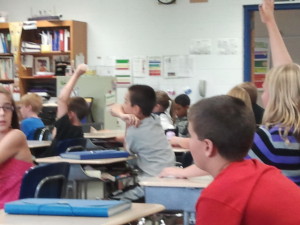For decades, a standard weekly spelling test was a bread and butter staple of every elementary and even middle school student’s routine. Typically teachers gave a pre-test on Monday, and students would be expected to practice their word list at home throughout the week in preparation for their Friday post-test.
However, the days of ‘round the kitchen table spelling test practice sessions are going by the wayside as more research has shown that the method of memorizing a list of words for weekly assessments does not make students better spellers.
 This school year St. Michael-Albertville students joined the growing ranks of students who no longer take weekly spelling tests, with the implementation of a new K-4 language arts curriculum that favors a different approach.
This school year St. Michael-Albertville students joined the growing ranks of students who no longer take weekly spelling tests, with the implementation of a new K-4 language arts curriculum that favors a different approach.
“The STMA School District did not seek out a language arts curriculum without spelling tests,” said Teri Johnson, director of teaching and learning for STMA schools, “but many English-Language Arts curriculum resources are moving away from weekly spelling tests. Johnson is new to this position and said she received all information for this article from district language arts teachers.
Instead of the old method of spelling tests that emphasize rote memorization, Johnson said students are now using a program called Word Study, which is based on learning spelling patterns and applying phonics and word analysis skills. Rather than a weekly assessment to determine a student’s mastery of a pre-selected set of words, she said students are given a weekly test to assess if they have learned the phonetic pattern(s) they have been studying.
Word Study focuses on different themes such as compound words, common vowel teams or the practice of dropping the “e” before adding “ing.” Students practice these skills in different ways, such as making a classroom word wall, a pocket dictionary or playing games to help them apply their word knowledge.
Johnson added that fifth grade students, who also used to take spelling tests, also stopped taking them last year when the middle schools changed language arts curriculum. The spelling portion has been replaced with lessons on Greek and Latin roots, which she said assists students in improving and increasing their academic vocabulary.
Big Woods second grade teacher, Jean Childs, said that teachers are new to this curriculum and have yet to complete a full unit, so she can’t comment on how the program is going so far. However, a former student of hers, who happens to live in this writer’s household, has proclaimed the new Word Study program to be “way funner!” than his previous years of spelling tests. With the added benefit of less homework to get through at night, Word Study may prove to be “way funner” for most of STMA’s kids … and their parents, too.